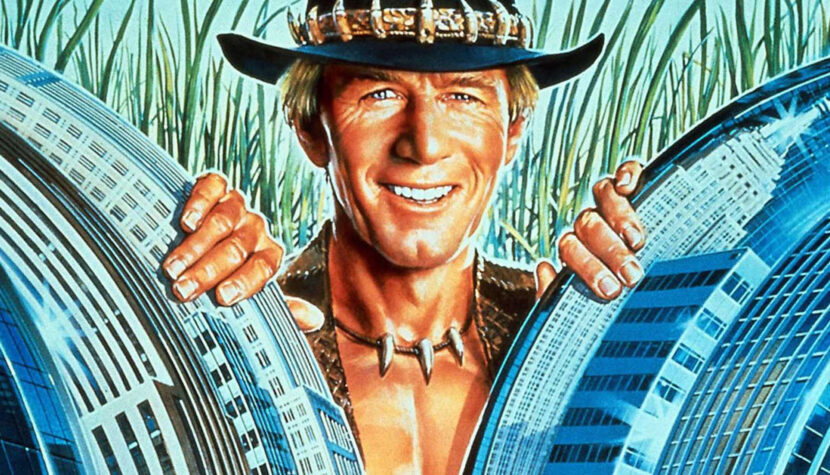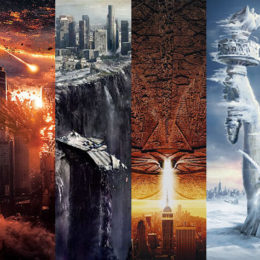CROCODILE DUNDEE. The Twilight of an Era of Old Masculinity

Even in its time, around the mid-80s, a character like Michael Dundee, the crocodile hunter and Australian bushman, seemed exotic. He was too uncouth to be Indiana Jones’s equivalent but just as charming towards women as Allan Quatermain – as long as he wanted to be and was currently sober. Such a troglodyte sold well to the audience thanks to his comedic style. Perhaps if Crocodile Dundee were a serious action film, it wouldn’t have achieved the same success and timelessness. Or perhaps the opposite – it might have, even as a whole film series. We will never know. Nowadays, such characters are absent from cinema. They are too straightforward in their meaning, and contemporary pop culture, with its multitude of equal narratives where everyone is right, does not tolerate firm opinions.
In our times, the old concept of masculinity is slowly fading. Not that I blame it, as certain male roles, behaviors, and ideals no longer align with modern society and should be effectively eradicated. Paul Hogan, creating the character of Mick Dundee, presented them in a distorted mirror even before the rise of so-called women power. One cannot blame him for deliberate troglodytism, although he was not an angel in his personal life. Everyone makes mistakes, but it’s essential not to remain unreflective about them throughout one’s life. Dundee, on one hand, was an incredibly wild man, unadapted to civilization, paradoxically better behaved towards it than it was towards his world.

He could also choose what he truly wanted without hypocritical pretense to others, and what he wouldn’t be able to accept. The masculinity of the character created by Paul Hogan was not shallow; one could rather call it primordially wild and uncouth but never malicious or derogatory towards others. That’s the ideal I had in mind when I mentioned that in today’s times, the old concept of masculinity is slowly fading. This form, created by civilization and labeled as a normal state of affairs, has nothing to do with it.
For this perfect parody and presenting a tough action hero in a comedic style in 1987, Paul Hogan was awarded a Golden Globe. Moreover, this well-deserved award somehow sealed his lifelong connection and the imprisonment of his acting personality in the form of Crocodile. And that’s a shame. A character like Hogan had great charisma, which should have been utilized in action cinema. Peter Faiman’s film, in essence, cannot be fully classified as part of that genre. There’s too much comedy and showcasing of social relations. Typical action cinema does not focus on emotions; it overwhelms the viewer with pace and fireworks in the form of shootouts, chases, and beatings. However, Crocodile cannot be accused of an excess of such action.

The success of this film was probably a one-time shot. One might wish for the story of the Australian crocodile hunter to endure like Indiana Jones’s adventures. Attempts were made in 1988 (Crocodile Dundee II), 2001 (Crocodile Dundee in Los Angeles), and 2020 (Mr. Dundee. The Return). I haven’t seen the latest one yet, but if the film leans towards a typical comedy rather than a reflective film summarizing Crocodile’s career, it will likely share the fate of other attempts to revive Dundee’s character. In reality, only the first installment of the series is impressive and worth remembering. Confrontations like Crocodile’s encounter with modern civilization and showing how affluent, pop-culture corporate people mock him are amusing only to a limited extent within one film. Making it a permanent element for amusing the audience won’t pass the test, won’t create a significant narrative, and over time, will only interest fewer mature viewers. In the long run, it turned out that the excellently written character of Dundee is so hermetic, developed, and complete that it’s impossible to squeeze more out of it than a one-time, good story. This is no shame or failure. Sometimes it’s better to make one good film that will be remembered in the history of cinema than several mediocre ones. Western creators don’t seem to understand this very well, or more precisely, they exhibit a strange amateurism in judging what makes good material for a series and what absolutely doesn’t.
And here, we return to action cinema and Hogan’s wasted potential, specifically Crocodile’s character. Both Indiana Jones and Allan Quatermain were not strictly comedic characters, although lighter, comedic situations were often introduced into their behavior. Crocodile Dundee shifted the boundary between comedy and action too much towards cheap entertainment, parody, instead of delving into a more suspenseful atmosphere with a more complicated adventure plot. That’s where I see the reason why Hogan’s potential was squandered from the start. Additionally, the film got entangled in an extensive sociological subplot, namely Crocodile’s relationship with Sue Charlton (Linda Kozlowski).

Returning to the archetypal masculinity of Crocodile Dundee and the way it distinguishes itself from troglodytic, sexually racist standards of behavior adhered to by men believing in the strength of masculine, puritanical civilization, Dundee is pro-ecological. Think about it; which typical macho, often referred to as “SMS,” respects the environment and cares about ecology? Perhaps there isn’t much empathy towards transgender issues in Crocodile, but there is great respect for another person, as long as they behave courteously.


